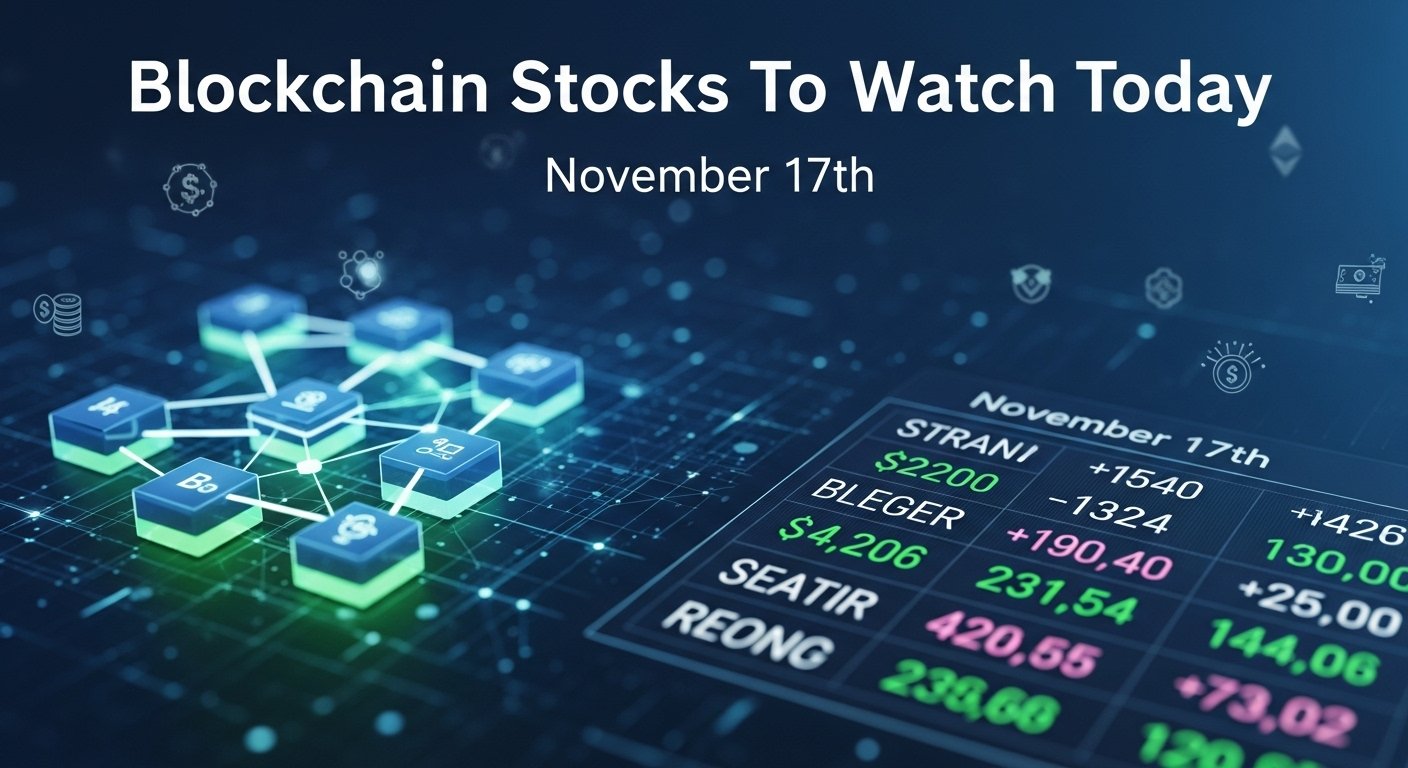If you follow digital assets, you know that volatility never sleeps. The same is true for blockchain stocks, which move not only with earnings and interest rates, but also with Bitcoin, crypto ETF flows, and regulatory headlines. Around November 17th, markets have been digesting a sharp pullback in Bitcoin after a strong run, along with a broader equity selloff that hit major U.S. indices. That combination has created both anxiety and opportunity for investors hunting Blockchain Stocks To Watch Today – November 17th.
On one side, Bitcoin has been trading below recent highs near the six-figure mark after a notable weekly drawdown, cooling some of the euphoria around digital assets. On the other, institutional adoption has continued to advance. The U.S. Securities and Exchange Commission (SEC) has approved spot Bitcoin and Ether exchange-traded products and recently allowed in-kind creations and redemptions for crypto ETPs, making these vehicles more efficient and potentially more attractive to big-money players. At the same time, regulators have greenlit multi-crypto ETFs that hold a basket of leading coins, further weaving digital assets into the traditional financial system.
Beyond trading, blockchain technology is quietly reshaping capital markets infrastructure. The London Stock Exchange Group (LSEG), for instance, is bidding to issue the UK’s first digital gilt using blockchain rails, aiming to modernize how government bonds are issued, settled, and managed. Large investment banks are also running transactions on private, permissioned blockchains, demonstrating real-world applications beyond speculation and meme coins.
Against this backdrop, crypto stocks, Bitcoin stocks, and broader blockchain technology stocks have moved to the center of many watchlists. In this guide to Blockchain Stocks To Watch Today – November 17th, we will walk through the key categories of stocks in this theme, highlight notable names like Coinbase, Riot Platforms, Marathon Digital, MicroStrategy, Block, Robinhood, Nvidia, and more, and outline the trends and risks you should understand before investing.
The Market Backdrop Around November 17th
To understand which blockchain stocks to watch today, you first need to understand the environment they are operating in.
Equity markets around November 17th saw renewed volatility, with the Dow dropping more than 500 points on that day as investors reassessed growth, inflation, and rate expectations. At the same time, Bitcoin resumed selling after one of its sharpest weekly declines in months, and Ether and major altcoins also traded choppily. When you see that kind of two-sided pressure, crypto-related stocks often amplify the moves rather than dampen them.
Yet, under the surface, several supportive forces remain in place. The SEC’s evolving stance on crypto ETFs and in-kind mechanisms suggests greater comfort with digital assets inside regulated wrappers. A growing pipeline of crypto ETF filings and approvals — including multi-asset products that hold Bitcoin, Ether, XRP, Solana, and more — continues to blur the line between “traditional” and “crypto” investing.
For Blockchain Stocks To Watch Today – November 17th, that means the macro backdrop is mixed but far from hopeless. Pullbacks may create entry points, but investors must distinguish between high-quality Web3 infrastructure plays and speculative names that simply track short-term sentiment.
The Types Of Blockchain Stocks

Before drilling into specific names, it helps to break the universe of blockchain stocks into a few broad buckets. These categories share a common connection to distributed ledger technology but carry very different risk–reward profiles.
Exchanges And Brokerage Platforms
At the heart of the ecosystem are exchanges like Coinbase Global (COIN) and trading apps such as Robinhood Markets (HOOD). Lists of leading blockchain and crypto stocks often highlight these names because their revenues are tightly linked to trading volumes and user activity. When markets are hot, retail and institutional trading surge, boosting fees. When sentiment cools, volumes shrink, and profits can compress quickly.
These crypto exchange stocks give investors leveraged exposure to market activity and to the growth of digital asset adoption, but they also come with regulatory and competitive risks.
Bitcoin Miners And Infrastructure Providers
Another key group is Bitcoin miners and crypto infrastructure companies. Names like Riot Platforms (RIOT), Marathon Digital Holdings (MARA), Bitfarms, and CleanSpark appear regularly on “top blockchain and Bitcoin stocks” lists. Their business model revolves around securing proof-of-work networks such as Bitcoin in exchange for block rewards and transaction fees.
For these miners, profits depend on three key factors: the price of Bitcoin, their energy and hardware costs, and the network’s mining difficulty. This makes them highly cyclical and operationally complex, but also one of the purest ways to trade the underlying asset through blockchain stocks.
Companies With Big Bitcoin Treasuries
Some firms, like MicroStrategy (MSTR), act almost like quasi-Bitcoin ETFs because they hold large amounts of Bitcoin on their balance sheets. MicroStrategy has famously accumulated tens of thousands of BTC over the years, turning its stock into a leveraged bet on the asset’s long-term trajectory.
Other corporations, including certain fintechs and payment processors, have also experimented with holding or accepting digital assets, making them hybrid plays between traditional business lines and crypto exposure.
Fintech And Payment Platforms Integrating Blockchain
Payment pioneers such as Block (SQ) and PayPal (PYPL) have been integrating crypto trading, custody, and merchant acceptance into their platforms. These companies are not purely crypto stocks; they still derive most of their revenue from card payments, point-of-sale hardware, or peer-to-peer transfers. But by enabling Bitcoin and other token transactions, they position themselves to benefit from Web3 adoption while retaining diversified cash flows.
Semiconductors And Hardware Enablers
At a deeper layer of the stack sit chip designers like Nvidia (NVDA) and, to a lesser extent, AMD. Their GPUs have historically been used for mining and for running complex blockchain and AI workloads. Many best-of lists for blockchain technology stocks include Nvidia because demand for data center and high-performance computing hardware supports both AI and distributed ledger applications.
Traditional Finance Embracing Blockchain Rails
Finally, a growing set of incumbent financial institutions use blockchain infrastructure without branding themselves as crypto firms. CME Group offers crypto derivatives and benefits from the growth in regulated futures and options markets, while Mastercard collaborates with blockchain partners to support crypto cards and cross-border payments. LSEG’s push for a digital gilt and major banks’ in-house tokenization platforms extend this theme into fixed income and fund administration.
These names give exposure to Blockchain Stocks To Watch Today – November 17th in a way that is more tied to infrastructure, payments, and regulation-friendly rails than to pure price speculation.
Blockchain Stocks To Watch Today – November 17th

With this framework in mind, let’s look at some of the blockchain stocks to watch today around November 17th, focusing on catalysts, positioning, and risk factors. This is not investment advice or a list of buy recommendations, but an educational overview to help guide your own research.
Coinbase Global (COIN): The Flagship Crypto Exchange
Coinbase is often the first name investors think of when they hear crypto stocks. As the largest U.S.-based regulated cryptocurrency exchange, its fortunes are closely tied to trading activity, staking, custody services, and institutional inflows. Many stock screeners and comparison tools list COIN as one of the top blockchain technology stocks due to its central role in the digital asset ecosystem.
Around November 17th, Coinbase sits at the intersection of several trends: the growth of spot Bitcoin and Ether ETFs that need custodial and liquidity partners, rising institutional interest, and ongoing regulatory debates in the U.S. Its revenues can fluctuate sharply with crypto prices, but its brand, technology stack, and regulatory licenses give it a strategic advantage as Web3 matures.
For traders watching Blockchain Stocks To Watch Today – November 17th, COIN often functions as a barometer for the health of the broader digital asset market.
Riot Platforms (RIOT): Bitcoin Mining At Scale
Riot Platforms is a major North American Bitcoin miner frequently cited among top Bitcoin stocks and blockchain stocks. The company operates large mining facilities, focusing on low-cost power, efficient hardware, and scale. Its revenue and profitability are highly leveraged to the Bitcoin price and to network dynamics such as difficulty and block rewards.
Recent earnings and production updates from Riot and peers have kept investors focused on hash rate growth, energy contracts, and post-halving economics. In periods like mid-November, when Bitcoin pulls back after a big run, RIOT can see outsized moves, making it one of the more volatile Blockchain Stocks To Watch Today – November 17th.
Marathon Digital (MARA): Another High-Beta Bitcoin Play
Marathon Digital Holdings (MARA) is another pure-play Bitcoin miner that often trades in tandem with both BTC and Riot. Like Riot, it appears frequently on curated watchlists for crypto and blockchain names. Marathon has focused on scaling its operational hash rate and optimizing its fleet of mining rigs, while also working to secure power agreements that can withstand commodity price swings.
For investors, the key questions include how efficiently Marathon converts energy into hash power, how robust its balance sheet is during downturns, and how it navigates environmental and regulatory scrutiny. As of November 17th, MARA remains an important component of any discussion about high-beta blockchain stocks.
MicroStrategy (MSTR): The Corporate Bitcoin Vault
MicroStrategy is technically a software analytics company, but the market often values it based on its Bitcoin holdings. Over several years, MicroStrategy has aggressively accumulated BTC, issuing debt and equity to expand its treasury and positioning itself as a kind of leveraged Bitcoin ETF proxy.
When Bitcoin rallies, MSTR can outperform many Bitcoin stocks and crypto ETFs; when Bitcoin corrects, the downside can be just as dramatic. Around November 17th, with Bitcoin trading below recent highs after a weekly selloff, MicroStrategy’s stock behavior becomes particularly important for investors who want amplified exposure to the asset without directly buying coins.
Block (SQ) And PayPal (PYPL): Fintech Meets Web3
Block, formerly Square, has integrated Bitcoin trading into Cash App and has invested in the Bitcoin ecosystem, including self-custody and Lightning Network initiatives. PayPal has enabled users to buy, hold, and sell popular cryptocurrencies and has worked on stablecoin and checkout integrations.
These companies are not pure blockchain stocks, but they represent a powerful convergence of digital payments, mobile wallets, and crypto adoption. Their share prices respond not only to blockchain trends but also to competition in payments, regulatory updates, and macro conditions. For a diversified approach to Blockchain Stocks To Watch Today – November 17th, SQ and PYPL can provide exposure with more traditional revenue streams.
Robinhood Markets (HOOD): Retail Gateway To Crypto
Robinhood started as a commission-free stock trading app but has grown into an important gateway for retail crypto traders. It appears on several lists of trending blockchain technology stocks thanks to its crypto trading volumes and expanding asset support.
HOOD’s key drivers include active user growth, assets under custody, trading volumes across equities, options, and crypto, and the monetization of its platform via net interest income and order flow. When crypto stocks are in favor and meme trading surges, Robinhood often benefits. Conversely, risk-off environments and regulatory scrutiny can weigh on the stock.
Nvidia (NVDA): Chips Powering AI And Blockchain
While Nvidia is best known as an AI and gaming powerhouse, its. GPUs also power many blockchain workloads, from mining to node infrastructure and on-chain analytics. Many investors view NVDA as a critical “picks and shovels” provider for both AI and Web3 infrastructure. Adding it to their broader blockchain stocks basket.
Around November 17th, Nvidia’s share price reflects not only crypto activity but also demand. For data center and AI products, making it a more diversified play than pure miners or exchanges. For longer-term investors, the overlap between AI, edge computing, and distributed ledger technology offers a compelling structural narrative.
Key Trends Shaping Blockchain Stocks After November 17th
To evaluate Blockchain Stocks To Watch Today – November 17th. It’s essential to look beyond daily price swings and focus on medium-term trends.
One of the most important is the evolution of crypto ETFs and regulated investment products. The SEC’s move to permit in-kind creations and redemptions for crypto. ETPs aligns these products more closely with commodity-based funds and may improve liquidity and tax efficiency. At the same time, the approval of multi-crypto ETFs — holding Bitcoin, Ether, and other large-cap coins — signals. A shift toward diversified, benchmark-like exposure for institutions and advisors.
Another trend is the tokenization of traditional assets. LSEG’s bid to support a digital gilt program and major banks executing fund transactions on private blockchains. Demonstrate growing confidence in tokenized securities and on-chain settlement. For blockchain infrastructure providers, exchanges, and custodians. This opens new revenue streams that do not depend solely on retail trading volumes.
Finally, the pipeline of crypto-related ETFs and ETPs, including “blue chip crypto”. Products and multi-asset funds continue to highlight both enthusiasm and regulatory caution. As more products come to market, crypto stocks that provide liquidity, custody, market-making. Or derivatives infrastructure may see increased demand for its services.
See More: Best Blockchain Investment Platforms for Beginners Top 10 Trusted Options 2025
How To Research Blockchain Stocks Before You Invest
With so many blockchain stocks flashing across the screen on. November 17th, it can be tempting to chase whatever is moving that day. A more disciplined approach involves combining traditional equity analysis with an of crypto market structure.
Start by examining fundamentals: revenue composition (how much is truly from digital assets), profitability, balance sheet strength, and cash burn. For Bitcoin miners, look at hash rate, cost per BTC mined, power contracts, and capex plans. For exchanges and brokers, evaluate trading volumes, take rates, and diversification into staking, custody, and institutional services.
Next, consider how each stock correlates with Bitcoin and Ether. Some names, like MicroStrategy or Riot, act almost like leveraged BTC trackers, while others, like Nvidia or Mastercard. Offer more diversified exposure to blockchain technology and digital payments.
Risk management is crucial. Crypto stocks can be extremely volatile, and even high-quality companies can see large drawdowns during market corrections. Sizing positions appropriately, avoiding excessive leverage, and maintaining a long-term perspective are all important.
Finally, stay informed. Regularly consulting earnings reports, regulatory updates, and curated lists of top blockchain technology stocks from. Reputable finance platforms can help you refine your watchlist and avoid outdated narratives.
Final Thoughts
As of November 17th, the story of Blockchain Stocks To Watch Today – November 17th is one of contrasts. Short-term volatility in Bitcoin, crypto ETFs, and equities has reminded investors. That this is still a high-beta corner of the market. Yet the steady march of institutional adoption, tokenization of traditional assets, and regulatory normalization continues in the background.
For investors, the opportunity lies in separating signal from noise. Exchanges like Coinbase, miners such as Riot and Marathon, treasury-heavy names like MicroStrategy, and fintech platforms. Like Block, PayPal, and Robinhood, and enablers like Nvidia and CME each offer a different angle on. The same theme: the migration of value, data, and financial infrastructure onto blockchain rails.
If you approach these blockchain stocks with a clear framework, realistic expectations, and robust risk management, you can use days. Like November 17th — when volatility reveals both winners and losers — to refine your strategy rather than react to headlines.
This article is for informational and educational purposes only. And should not be taken as financial advice, a solicitation, or a recommendation to buy or sell any security. Always do your own research or consult a licensed financial professional before investing.























